Executive Summary
2022 was a year of community action, environmental justice, preparedness, and organizational growth for Resilient Virginia. Last year, the organization:
- Increased membership by 131% from 2021 numbers;
- Developed and produced 8 Resiliency Academy sessions with a registration increase of about 25% from 2021 registration numbers;
- Hosted an Annual Meeting, our first-ever hybrid event, where we met with about 70 colleagues in Charlottesville and virtually;
- Launched a Member Portal where Resilient Virginia members can access slides and recordings from previous events and connect with other members of the organization;
- Took steps toward launching the Resilient Virginia Collaborative Alliance;
- Partnered with Virginia Tech and the University of Virginia to build workforce capacity through engagement with over 40 undergraduate and graduate students;
- Partnered with Sobis Inc, under a grant from Piedmont Environmental Council, to develop Albemarle County’s Climate Vulnerability and Risk Assessment;
- Partnered with Sobis Inc, Leslie King Consulting, and other Lynchburg-based organizations and institutions to start Lynchburg Rising – an environmental justice project funded by a grant from the US EPA Office of Environmental Justice;
- Advocated for regional resilience through participation in Resilient Fairfax’s Community Advisory Group and Roanoke’s Flood Resilience Plan Steering Committee;
- Advocated for a statewide approach to resilience through participation in VA DEQ’s Flood Resilience Outreach Strategy Plan NGO advisory group and VA DOT’s Environmental Stakeholders Engagement Group.
Sponsorship and Membership
In 2022, Resilient Virginia saw an exponential jump in membership, interactions on our social media pages (LinkedIn, Facebook, and Twitter), and registrations for our quarterly newsletter.
Member benefits included:
- Bi-monthly Member Briefs;
- Discounts to all Resilient Virginia events;
- Access to our Member Portal; and
- An invitation to our Listening Sessions.
- Cox Communications (Annual Sponsor – Energizer and Resiliency Academy Sponsor)
- Witt O’Brien’s (Annual Sponsor – Energizer)
- Clark Nexsen (Annual Sponsor – Community Leader)
- Marion Enterprises (Annual Sponsor – Community Leader)
- Tetra Tech (Annual Sponsor – Community Leader)
- Virginia Energy (Annual Meeting Sponsor)
- Stantec (Annual Meeting Sponsor)
- Virginia Resources Authority (Resiliency Academy Sponsor)
- TomorrowToday (Resiliency Academy Sponsor)
- Launch! Consulting (Resiliency Academy Sponsor)
- Virginia Clean Cities (Resiliency Academy Sponsor)

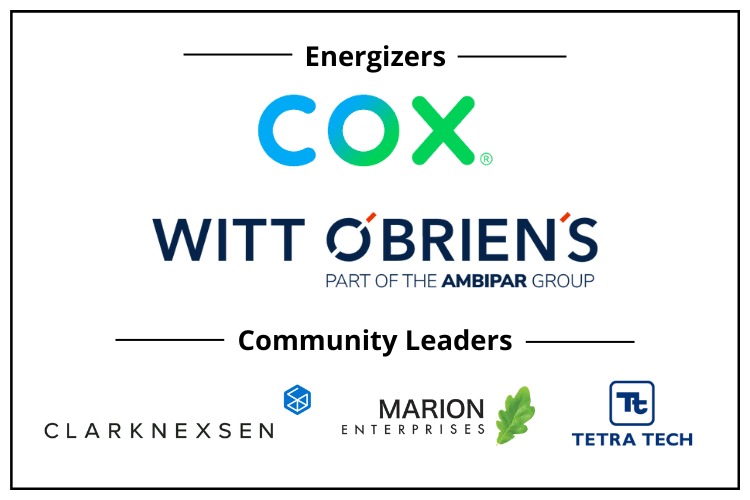
Informing, Educating, and Collaborating
2022 Resiliency Academy Series and Annual Meeting
Extreme weather events are increasing in Virginia, causing damage and disruption to communities across the state. This only escalates the need for communities to plan for resiliency. Because of this, we carefully chose topics and speakers for our educational seminars that would best meet the specific needs of Virginia’s communities. Our series were centered on the four main components of a resilient community and included the following topics:
Innovative Financing for Resilience
Tools for Resiliency Planning
Utilizing Green Infrastructure
Resilient Transportation
Investing for Resilience
Disaster-Resilient Buildings
Mitigating Climate Impacts with Forests, Farms, & Fields
Creating Resilience Hubs for Community Safety
Progress in Addressing Climate Impacts
Local Government Case Studies
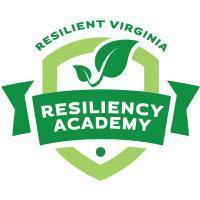
We chose to keep our Resiliency Academy a virtual event, believing that is the most equitable way to educate communities across the entire state. We were fortunate to have 31 expert speakers join us for these events who shared their knowledge of funding opportunities, resilience strategies, relevant policies, and present their own experience in resiliency planning. Resiliency Academy average registration increased approximately 25% from 2021 registration numbers. Registrations came from many sectors, including local, state, and federal government, higher education (students and faculty), community organizations, and business.
Thank you to our 2022 Resiliency Academy Speakers
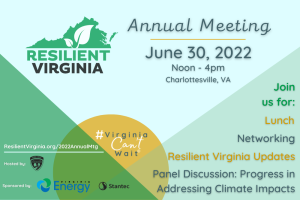
On June 30th we held our Annual Meeting at the Department of Forestry Office in Charlottesville with the option to join virtually. About 70 colleagues joined us for this hybrid meeting. This was our first in-person event since 2020 and our first-ever hybrid event. For the meeting, we chose to highlight the progress that Virginia is making in addressing climate impacts. Included in the presentation were three examples of Virginia communities taking action. Representatives from Albemarle County, Fairfax County, and the Town of Blacksburg spoke to the gathering about how their communities have started to effectively address the climate impacts they are experiencing.
Thank you to our 2022 Annual Meeting Speakers
Resilient Virginia Collaborative Alliance
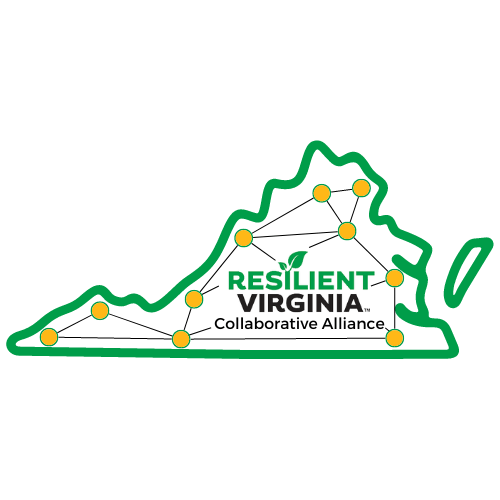
In 2022, Resilient Virginia began the soft launch of our Resilient Virginia Collaborative Alliance (RVCA). The RVCA will empower local and regional governments, academic institutions, community groups, and the private sector to collaborate, share resources and tools, secure funding, and streamline the process of resiliency planning in these communities. This Collaborative will ultimately help communities in the Commonwealth more efficiently and effectively mitigate and adapt to the impacts of climate change. In 2022, we worked with Virginia Tech graduate students to perform a feasibility study and strategic plan for the Collaborative, and began securing Founding Sponsors.
Partnering with Universities to Build Workforce Capacity
Resilient Virginia partnered with Virginia Tech and the University of Virginia to build workforce capacity through engagement with over 40 university students in 2022.
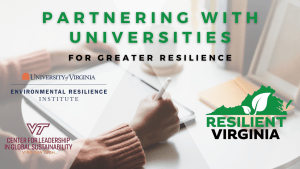
Specific projects included:
- Guiding a team of 3 UVA undergraduate students, over two weeks, through an analysis of local Virginia comprehensive plans and hazard mitigation plans in which they identified resiliency language and concepts. See Integrating Resiliency Language Into Existing Plans.
- Guiding a team of 3 UVA undergraduate students, over two weeks, through a review of Virginia’s Coastal Resilience Master Plan and VASEM’s report, “Impact of Climate Change on Virginia’s Coastal Areas”. Based on their findings, they then identified resources and made recommendations for developing regional resiliency plans for rural, non-coastal areas of the state.
- Co-developing an assignment with Virginia Tech’s Center for Leadership in Global Sustainability (CLiGS). This month-long assignment gave graduate students the opportunity to do a feasibility study on resilience collaboratives, specifically for rural, inland areas. Their research is laying the groundwork for our Resilient Virginia Collaborative Alliance.
- Hosting an undergraduate UVA student for a summer internship. This student went through a vast list of resources we have been accumulating for our Resource Hub – summarizing the resource, categorizing and tagging them according to our 4 Main Components of a Resilient Community, and developing a master spreadsheet.
- Guiding 2 Virginia Tech graduate students through their Independent Development Projects which took a deeper dive into resilience collaboratives, focusing on communications, outreach, and strategic planning.
Community Activation and Outreach in Albemarle County, Fairfax County, Lynchburg, & Roanoke
Albemarle County
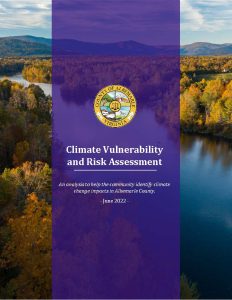
Resilient Virginia partnered with Sobis Inc under a grant from Piedmont Environmental Council to develop Albemarle County’s Climate Vulnerability and Risk Assessment. The report analyzes primary hazards the county will face in the future, who and what will be most vulnerable to the hazards, and what risks will be most likely. See Albemarle County’s Climate Vulnerability and Risk Assessment.
Fairfax County
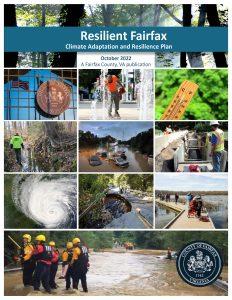
A Resilient Virginia staff member served on Resilient Fairfax’s Community Advisory Group. This group met periodically to provide input and insight to staff from the Office of Environmental and Energy Coordination, who were primarily responsible for the development of the county’s Climate Adaptation and Resilience Plan.
Lynchburg
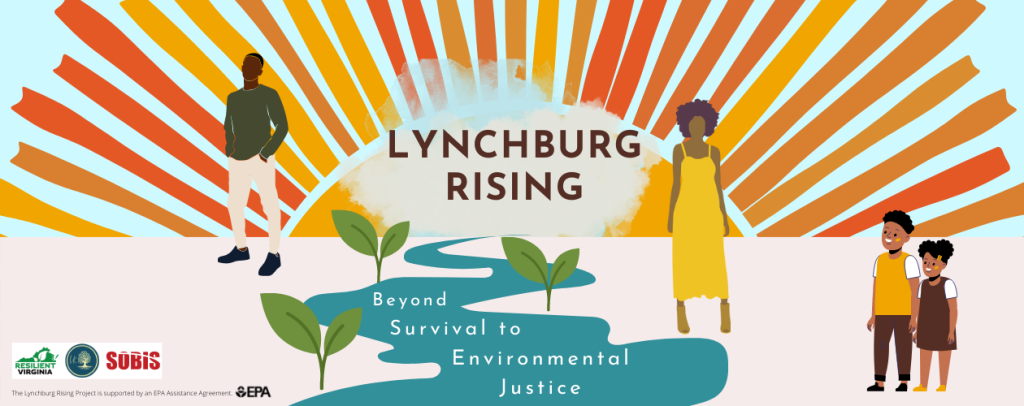
Resilient Virginia partnered with Sobis Inc, Leslie King Consulting, and other Lynchburg-based organizations and institutions to start Lynchburg Rising – an environmental justice project funded by a grant from the US EPA Office of Environmental Justice. We had broader community outreach efforts at Lynchburg’s Farmers Market and multiple events around the City. On December 13th, we held the first of four neighborhood meetings. These meetings will be a space for community members to open up about their experience with flooding. See Lynchburg Rising.
Roanoke
As a sponsor of Earth Day Roanoke 2022, Resilient Virginia staff spent a beautiful Saturday meeting new people and letting them know what we do. We met many people who were interested in learning more about resiliency, found out what aspects of resiliency are most important to the public, and we learned about other organizations out there working on making Southwest Virginia a vibrant place to call home for years to come.

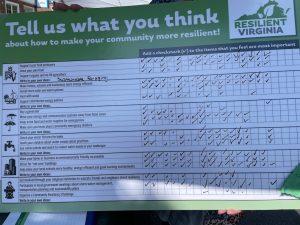
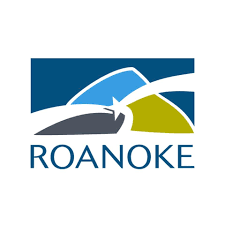
A Resilient Virginia staff member is serving on the Roanoke Flood Resilience Plan Steering Committee to help the City of Roanoke achieve their goals of:
- Identifying natural hazards and vulnerabilities, especially those for the most at-risk portions of the community;
- Analyzing current capacity and proposing strategies and solutions; and
- Developing a scorecard to rank projects with the most impact, with a focus on equitable ranking.
Taking a Statewide Approach
Resilient Virginia continued to advocate for a statewide approach to resilience in 2022. This included participating in Virginia Department of Conservation and Recreation’s Flood Resilience Outreach Strategy Plan NGO advisory group, Virginia Department of Transportation Environmental Stakeholders Engagement Group, and the Tree Roundtable Virginia Strategy Session, a planning session for the upcoming Chesapeake Bay Watershed Tree Canopy Funding and Policy Roundtable.
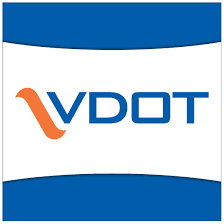
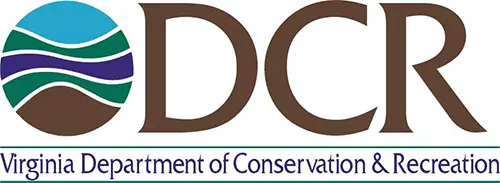
Looking Forward to 2023
Resilient Virginia started 2023 off with new projects and events to plan. The organization is:
- Securing final Founding Sponsors for the Resilient Virginia Collaborative Alliance and moving to the soft launch phase;
- Working on building out the Resource Hub and relaunching our website;
- Partnering with Virginia Energy and other organizations and institutions to work on a Renewables Advancing Community Energy Resilience (RACER) project funded by the US Department of Energy;
- Partnering with Virginia Commonwealth University and other organizations on a metro-Richmond area environmental justice data collection grant project awarded by the Winward Fund;
- Developing and producing a Spring Star Speaker Series;
- Developing and producing the 2023 Resilient Virginia Conference, a hybrid event to be held this summer; and
- Planning for the Fall Listening Sessions.
Thank you to our 2022 year-end donors – Barbara and Randy Swart, Linda Warren, and Katie Flick!
